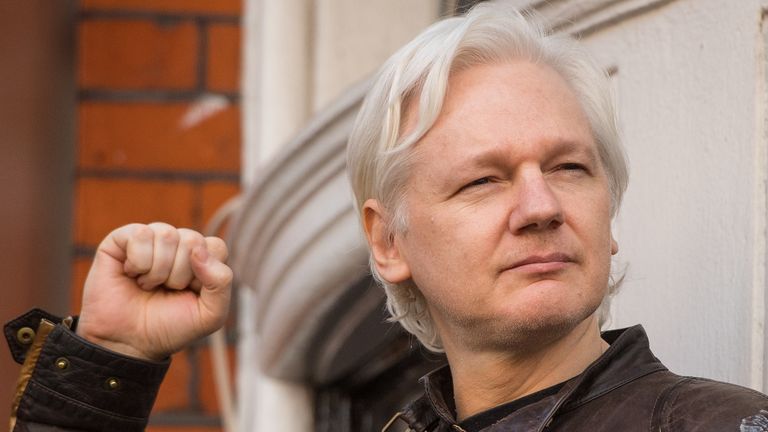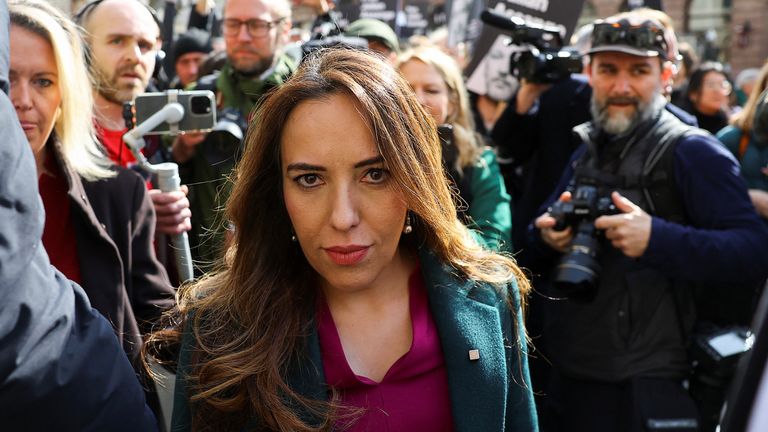Julian Assange's extradition to US delayed as he waits to find out whether he can appeal
American prosecutors allege the WikiLeaks founder encouraged and helped US Army intelligence analyst Chelsea Manning to steal diplomatic cables and military files his site published. The 52-year-old's supporters say he is a hero who is being persecuted for exposing US wrongdoing.
Tuesday 26 March 2024 19:51, UK
WikiLeaks founder Julian Assange will have to wait to find out whether he can appeal over his extradition to the United States, as the High Court ruled he cannot immediately be extradited on espionage charges.
A further hearing will now be held in May, two High Court judges said, unless the US can give further assurances about what will happen to him.
American prosecutors allege the 52-year-old encouraged and helped US Army intelligence analyst Chelsea Manning to steal diplomatic cables and military files his site published.
But Assange's supporters say he is a hero who is being persecuted for exposing US wrongdoing.
In a January 2021 ruling, then district judge Vanessa Baraitser said Assange should not be sent to the US, citing a real and "oppressive" risk of suicide, while ruling against him on all other issues.
But later that year US authorities won a High Court bid to overturn the block, paving the way for his extradition.
During a two-day hearing in February, Assange's lawyers asked to be able to challenge the original judge's dismissal of other parts of his case to prevent his extradition.
They argued American authorities were seeking to punish him for WikiLeaks's "exposure of criminality on the part of the US government on an unprecedented scale", including torture and killings.
Read more:
What might happen if Assange is extradited to the US?
In Tuesday's judgment, Dame Victoria Sharp and Mr Justice Johnson dismissed most of Assange's legal arguments, but said unless assurances were given by the US he would be able to bring an appeal on three grounds, including breach of freedom of expression and because he might receive the death penalty.
The judges said US authorities had three weeks to give those assurances, with a final decision to be made in late May.
US authorities have promised Assange would not receive capital punishment, but the judges said it is "conceivable that the assurance might be interpreted narrowly by the respondent, so as not to preclude the imposition of the death penalty".
The judges added: "If assurances are not given then we will grant leave to appeal without a further hearing.
"If assurances are given then we will give the parties an opportunity to make further submissions before we make a final decision on the application for leave to appeal."
Be the first to get Breaking News
Install the Sky News app for free


Speaking after the judgment, Assange's wife Stella said: "What the courts have done has been to invite a political intervention from the United States... send a letter saying 'it's all OK'. I find this astounding.
"This case is a retribution. It is a signal to all of you that if you expose the interests that are driving war they will come after you, they will put you in prison and will try to kill you.
"The Biden administration should not issue assurances. They should drop this shameful case that should never have been brought."
She later told Sky News' The World with Yalda Hakim her and her husband's greatest fear is his death.
"Julian risks losing his life either to the death penalty or to being assassinated. And if he is taken to the United States, he will be placed under conditions of extreme isolation which could and will drive him to commit suicide. It's just not safe to send him to the United States," she claimed.
She added: "Julian did nothing wrong... The US is criminalising public interest journalism.
"Exposing the killing of innocent people can never be considered a crime in a democratic society.
"We have two little boys - five and six years old. They need their father. Every day Julian is in prison is a day deprived of their father's love and affection.
"Julian should not spend a single day in prison. I want our children to grow up knowing that the British system put a stop to the persecution of a publisher. So far that is not the story I'm able to tell our children."



